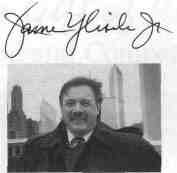
A VIEW FROM CHICAGO

We decided we had to leave the public schools. And not by choice
by James Ylisela Jr.
We are the kind of family Mayor Richard M. Daley says Chicago can't afford to lose. To keep us here, he's been busy reducing crime, cleaning up the neighborhoods and improving the public schools.
But after a long, agonizing summer, my wife, son and I decided we had to leave. Not Chicago. The public schools. And not by choice.
I'm a public school kid from the south suburbs; my wife grew up in the city and went to Catholic and public schools. And during the first eight years of his scholarly life, our son attended two Chicago public schools. They were far from perfect, but, given all the horror stories, they weren't that bad, either. We found devoted, hardworking teachers and a diverse group of parents who, like us, were trying to support a troubled system.
But when it came time to choose a high school, "not bad" wasn't good enough. High school is much too important to settle for less than adequate, and most city high schools can't even make that claim. In a 1998 analysis of state reading and math scores, the Chicago Sun-Times ranked 42 Chicago high schools among the 50 worst achievers in the state.
High school is much too important to settle for less than adequate, and most Chicago high schools can't even make that claim.
Still, our family wasn't ready to give up on the public schools. Instead, we decided to apply to the best public, parochial and private schools in the city: Whitney Young Magnet, St. Ignatius College Prep and Francis W. Parker. St. Ignatius and Parker required tests for admission, and on the appointed days, we drove our son to the schools for the several-hour ordeal. James has always been an A and B student, but he's not the world's greatest test taker, and I could tell he was nervous about the entrance exams.
But at least he got to take them. At Whitney, testing is by invitation only. Students who score high enough on their seventh-grade Iowa math and reading tests are invited to take the exam.
The top scorers on that test are then offered admission.
We weren't invited. The best private and parochial schools in town will give anyone a shot, but at the public school, we couldn't even get in the front door.
What's wrong with this picture?
As spring turned into summer, we kept calling Whitney, hoping our son could still take the test or at least come in for an interview. No one ever called back.
And when the test results came in from the other schools, James hadn't exactly blown away the competition, though he didn't do badly. He barely missed the cut at St. Ignatius. But Parker invited him to spend a day at the school, and my wife and I had a long and hopeful talk with the admissions director. With less than 20 spots available in the entire freshman class, we kept our fingers crossed and waited.
We sweated though the summer, and as Labor Day approached, we began to consider our other options. Another public school? A quick move to Oak Park or Evanston? Neither alternative seemed right.
Finally, the Parker admissions director called with good news: James was in. We celebrated, and tried not to think about those hefty tuition payments.
Our friends said we were lucky, and they were right. I suspect others thought we had aimed too high. After all, not every kid can get into the best school. That's certainly true, but it misses the point. If the public schools offer parents so few real choices, it's like having no choice at all.
And if you can't afford the private or parochial school tuition, you'll probably move to the suburbs, no matter what Mayor Daley does.
I don't mind that Whitney Young didn't accept my son. What bothered me was the way they did it: blindly, with nothing to go on but a piece of paper with outdated reading and math scores. Test scores may be one way to measure student aptitude, but they certainly aren't the only way.
Schools that rely only on test scores won't ever meet the clever kid with the great sense of humor, who's learning a mean little boogie woogie on the piano and can rattle off the films of Martin Scorcese from memory. And they'll miss out on a thoughtful and kind young man who would be an asset to any school he attended.
Their loss. ť
James Ylisela Jr. teaches urban reporting at Northwestern University's Medill School of Journalism. He's the consulting editor of The Chicago Reporter.
Illinois Issues November 1999 / 45